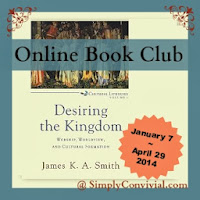First he makes the point that
The three arts are not "left behind' as one moves up the educational ladder, but they remain foundational, and each of them can color one's whole approach to learning.
Basically he is arguing for balance between these three areas and understanding them in relationship to each other - not as steps on a ladder. From there he traces the development of logic in philosophy. Although some of the history shows a "fight" between remembering and logic he considers this an unnecessary dichotomy - they are both necessary to fully understand our world.
The next point he focuses on is especially important in our current situation
To 'think' is not enough: you have to 'think about'; you have to ponder, rather than just flit from one image or phrase to another. This is the second of the major concerns of our revised Trivium. We need to educate people to think coherently and independently - to take responsibility for their own thoughts.
The section goes on to discuss how teachers should provide an orderly environment, guiding students towards topics worth learning and then helping students understand the connections within and between subject areas.
From here he refers largely to Chesterton as one who has truly thought things out. He supports Chesterton's argument that
But man has no alternative, except between being influenced by though that has been thought out and being influenced by though that has not been though out.
Obviously, Caldecott is in favor in helping our students follow lines of thought that are well considered. He agrees again with Chesterton that "clear thinking is one requisite of freedom". Caldecott also highlights the role that assumptions play in our thinking and that this is one of the difficulties of our current thought system - we have faulty assumptions - often not even understanding what they are or why they might not be complete. I cannot do this section justice so you should probably read it for yourself.
Next Caldecott begins to pursue the search for truth and here he makes the astute observation that
in fact the scientific method does not even aspire to truth, only to hypothesis, always open (in principle, at least) to revision or replacement by something better. Part of the process of thinking is to learn how to set all these different types or approaches to truth in the right order, to see how they combine to give a more complete image of reality as a whole - to make it perfectly plain that we need poetry as well as science, imagination as well as reason, empathy as well as mathematics.
From there he argues that in our modern world we try to detach thought from memory and see it as something separate - which leads to confusion.
He also quickly the tackles to connection between reason and faith and this sums up his thoughts here
Without the assurance of faith that the truth is somewhere 'out there', reason would stop short on the journey, it would give up.He references Pope John Paul II's works and then reaches back in time and talks about the difference between the Cartesian "I am" and the 'I am" of the Bible. This is a fascinating look at how grammar (literally) plays a role in thinking and identity.
Only 'I am,' he says, is 'both verb and noun at the same time.' And of course 'I am' is the name God gives himself in the context of sending Moses to the sons of Israel.Later
Decartes did not begin with memory, with 'Grammar': he went straight through to Thinking before going through Remembering. (remember he says 'I think, therefore I am.")
From there he explains some of the issues with Cartesian thinking. He moves into trying to find foundations for logic and we come to a place where I can regurgitate but I don't fully understand what he is exploring.
Finally, we come to his conclusions on its impact in the classroom
And because thinking is dialogical, the best way to encourage it is by dialogue, debate, conversation.Some key points he draws out are that without others our thinking often 'runs in circles', that expanding our thoughts often requires a community and that development of thinking also "involves the refinement of imagination and feeling". He sees courtesy and empathy as the two necessary pieces for this thought in community. From there he returns to Chesterton who says that "thanking is the highest form of thought".
Caldecott proposes that
Through Dialectic, or conversation, conduced in courtesy and thus in gratitude and respect, we ultimately arrive at the summit of human thought and discover that up there it is the same as prayer, or of that kind of prayer that is perfected in the liturgy of the Church.
He ends with this thought
Liturgy is the consummation of education and the ultimate school of our humanity.Which brings us back the Desiring the Kingdom and the role of worship in our lives as formative. Later this week I will add some of my reflections on this quick overview of his thinking.

